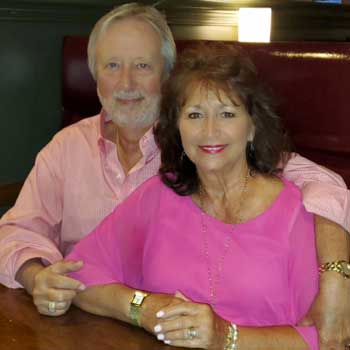Couple invests in future cancer breakthroughs with planned gift to support endowed chairs
By John Bethel
 When Billy Douglas was diagnosed with clear cell renal cell carcinoma (CCRCC), a highly aggressive cancer, he and his wife, Linda, braced for the worst. “Clear cell is the worst-case cancer cell you could ever have,” Billy recalled. “Stage 4, grade 4. Everything about that is bad. Everything. But after three years, here I am.”
When Billy Douglas was diagnosed with clear cell renal cell carcinoma (CCRCC), a highly aggressive cancer, he and his wife, Linda, braced for the worst. “Clear cell is the worst-case cancer cell you could ever have,” Billy recalled. “Stage 4, grade 4. Everything about that is bad. Everything. But after three years, here I am.”
“We feel like he’s here because of the Medical University of South Carolina and our good Lord,” Linda added. Their experience with MUSC inspired them to make a lasting impact on cancer research.
For Linda, the initial shock of Billy’s diagnosis and the uncertainty that came with his first major surgery remain vivid. “It was a very large surgery,” she said. “It took some pretty good doctors to get him through it.” Among the physicians instrumental in Billy’s recovery were board-certified oncologist Theodore Gourdin, M.D.; urologist Thomas Keane, M.D., professor and chair of the MUSC Department of Urology; and surgeon Satish Nadig, M.D., Ph.D.
Billy’s career in the marine industry had taken him across the South, where he saw many hospitals. But it was at MUSC where he found the care he needed. The couple’s journey through cancer was not just about medical procedures –
it was also a profound lesson in human kindness, community support and the importance of medical research. “From the first day we signed in at MUSC, we felt like we became part of their large medical family,” Billy said.
The decision to direct their estate toward cancer research at MUSC wasn’t impulsive; it reflected their deep belief in the institution’s ability to advance cancer treatment. Billy’s recovery, against significant odds, highlighted the importance of research and compassionate care – areas in which MUSC excels.
Their estate plan focuses on supporting endowed chairs at MUSC, which help attract top-tier physicians and researchers. “An endowed chair is the highest honor the University can bestow. It also helps MUSC attract and retain world-renowned faculty,” explained Lauren Albenesius, associate director of Development at MUSC Hollings Cancer Center. These chairs directly translate into better research, innovative treatments and ultimately more success stories like Billy’s.
The couple wanted their hard-earned money to contribute to advancements in cancer treatment. "It’s cherished money," Billy said, underscoring the importance of ensuring their resources would be used effectively. Their plan includes not only financial support but also fostering an environment where future doctors and nurses can thrive – further enhancing patient care.
Reflecting on the lasting impact of their gift, Linda emphasized the ripple effect that research can have. “Your researchers do the work to help others,” she said. “It could continue on to our grandchildren.” Their story is not just about giving financially; it’s about ensuring future generations may face fewer challenges with cancer thanks to the advancements made possible by their support.
Billy and Linda’s commitment to MUSC also extends beyond financial contributions. Billy recently authored Hope Is All I Have: Defying the Odds of Cancer, a memoir recounting his personal journey. He hopes it will provide comfort, inspiration and guidance to others navigating similar battles.
“Most people don’t want to think about cancer,” Billy said. “But when you’re diagnosed, you have to make a lot of quick decisions that you’re ill-prepared for.” Through his writing, Billy offers a source of encouragement and practical insight to others facing cancer, inspired by the support he received from MUSC.
As they look to the future, Billy and Linda find comfort knowing their legacy will support a cause that is deeply personal and profoundly impactful. “We want 100% of our money to go to a good cause,” Linda said. “We know that with MUSC, there are doctors and researchers who will make the most of it and keep going forward. And that’s a good feeling.”
For Billy and Linda, giving to MUSC is much more than a gesture of gratitude. It’s a commitment to ensuring that others benefit from the lifesaving care and compassionate support that transformed their lives. Through their philanthropy, they hope to make an enduring impact on cancer research, patient care and the continued growth of MUSC as a leader in health innovation for South Carolina – and beyond.



